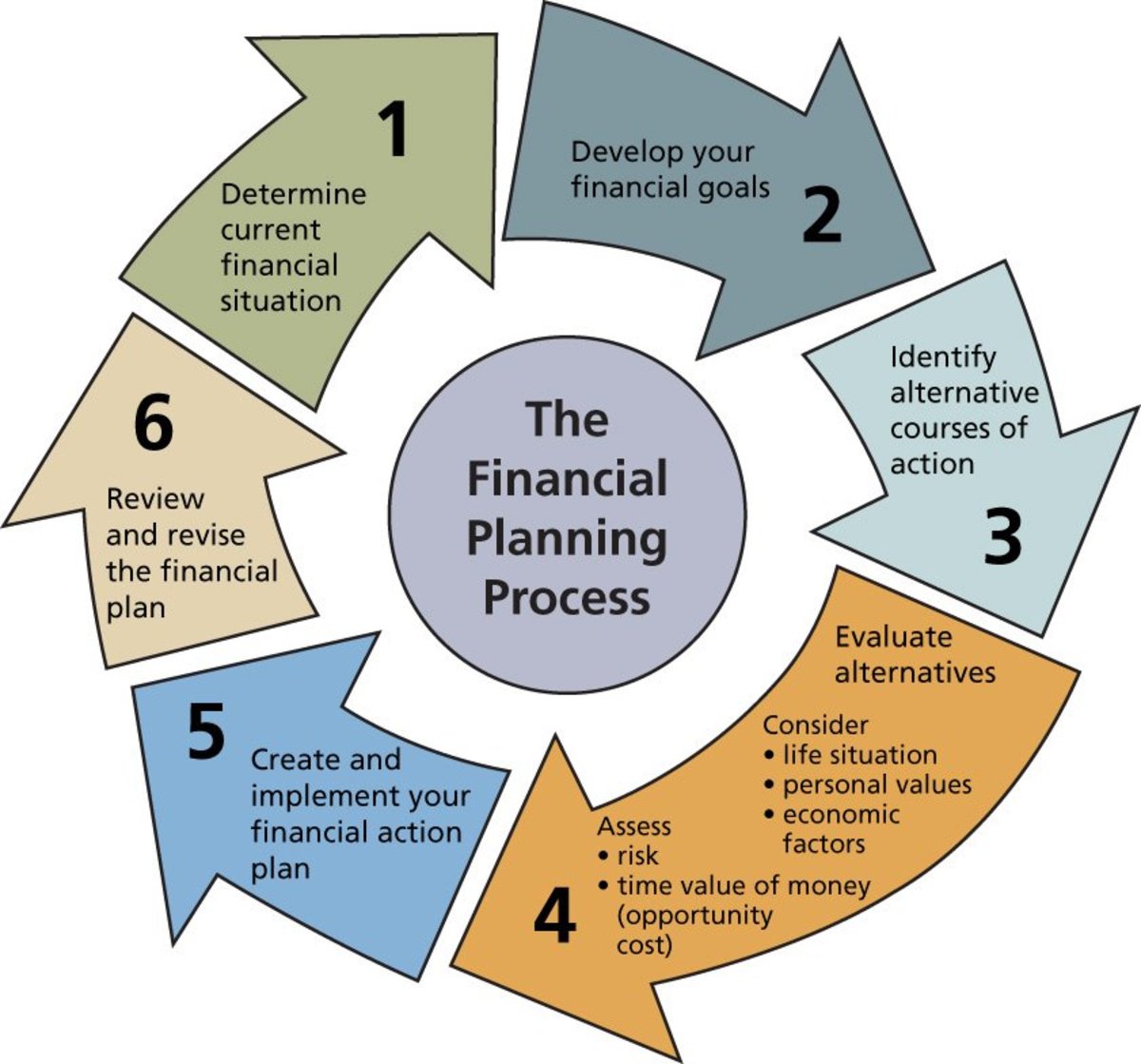How To Save For Your Retirement Now
FINANCIAL PLANNING FOR RETIREMENT
With the uncertain future for Social Security, people have many good reasons to worry about how they will afford retirement.
It is estimated that most people can plan on needing about 20 years of income after they retire from their "real jobs." Why? Because people are living longer and better! That's the good news.
With that in mind, it makes sense for people to start thinking about their retirement today rather than tomorrow, no matter what age.

Social Security is actually supposed to be a supplement to people's retirement fund. However, in many or even most cases, seniors rely only on Social Security for their entire income.
With the future of Social Security uncertain, it pays anyone 50 and above to start thinking about what they'll do.
The bottom line is that the earlier you start, the better off you'll be. If you delay even 10 years before starting to save for your retirement, you'll end up further from your goals of financial freedom than ever.
The recommended time frame for starting to save for your retirement? As soon as you start working and earning money!
If you have a pension or a retirement plan from your job, you're one of the lucky few left. Or if you're retired military, you might have a prayer at surviving without additional income or savings set aside!
For those of us who are either still working or have a spouse who is retired.....or for those of us who have our own retirement funds and are hoping for something from Social Security when we retire, there are some other things to consider about planning for retirement. The goal is how to make the most of your money and end up with more money to enjoy life with.
HOW TO SAVE FOR RETIREMENT
Debt is not your friend. While having good credit scores and good credit reports is essential for everyone and should be a priority, once you are close to retirement age or leading up to it by several years, your best friend is not going to be your indebtedness.
No matter what age you are, it's important to abolish debt but as you get nearer to retirement age, it becomes more imperative. That includes car payments and every other conceivable debt you owe except maybe your house payment. Even that can be a back breaker on a fixed income though.
Using credit cards to purchase things or borrowing on credit only increases your vulnerability. In fact, you are throwing money away by buying anything on credit. The appliance that you bought that was such a great deal ends up being 2 or 3 times more expensive than the great sale price you thought you got! Credit card purchases unless paid off in full every time are about as good for retirement as setting your money on fire and watching it burn.
Don’t tap into the vein of your retirement accounts before you retire. Things like 401(k)s or IRAs were set up to use when you retire , not for something like going on vacation. If you take money out early on these retirement accounts, you will be charged a 10% penalty for early withdrawal. Again, you might as well set your money on fire and watch it burn.
If you are still working, you should do everything you can to participate in your employer's retirement plan and if they don't have a retirement plan, talk to a financial advisor about getting a plan! It's never too late to start saving for retirement.
Save for tomorrow starting today. No matter what age you are, if you think about needing 20 years worth of income when you retire, there's no time like the present to start socking away your money.
Whether you put money into 401(k)s or IRAs or you open an on-line savings account (which incidentally will pay you 5-6 times more in interest than a bricks and mortar lender and are also insured by the FDIC), you can't have money saved if you don't actually put it into that "envelope" earmarked as your savings for retirement!
Buy bonds if you want to go the safe route....or treasury bills and just set them aside as if you never saw them. You'd be surprised how over time, even the worst investments can add up and turn positive.
If you have investments that are jumping up and down, and you have the time to wait it out, chances are that they will come back and make money for you.
Short term investing where you need the money in the next 5 years for instance are best kept to safe things like stocks and bonds.
But if you're young and
you've got a long, long way to retirement, you can have more investments
in the "riskier" categories because they will make you money over
time....though you may see some rise and fall in them. In long term
investing, the important thing is to hang on and wait out the recovery!
When it comes to saving for retirement, like Nike says.....just do it! You'll rest easier at night and feel better about the future. Life goes by in a flash and before you know it, you could be looking at retirement or getting close to it and where's your money?
Tips on Saving for Retirement
- If you retire at 62 (or basically before 70 if you want to be honest about it) you're losing money from your Social Security benefits.
- If you retire at 62, you will perpetually receive less money than you'd have received if you waited until 70.
- You lose on average about 6% to 8% of what you'd have gotten had you waited to age 70.
- At the current time with the current tanking of the economy, unfortunately many people had to take retirement at 62 or earlier than they had expected just in order to generate income.
- If you've paid off your debt and are in a fairly solvent position now, start attacking your mortgage principal. You'll be building equity and will pay off your home loan faster.
- Even paying the regular payment amount twice per month on your mortgage helps reduce your interest faster!
- Put the max that you can into a 401(k) or an IRA.
- People over 50 can legally contribute extra monies to a 401(k) or other plan sponsored by an employer.
- For IRAs, you can also contribute extra monies. Check with your accountant or your human resources person at work and stash away the maximum amount allowable for your retirement funds!
- Reverse mortgages are becoming the plan of choice for many people over age 62. A reverse mortgage is basically based on the equity built into someone's home. You can receive a line of credit, a monthly income, or a lump sum of money for whatever your equity is.
- The money is not paid back to the bank until the home is sold and the mortgage can never exceed what the house is actually worth.
- The downside of reverse mortgages is the upfront charges (closing costs). There are also things to consider such as what happens if the mortgagee has to leave for a period of time to go into a nursing home and eventually will come back to the home?
- There are reverse mortgages and there are reverse mortgages so know all the ins and outs of them before signing on the dotted line. There is mandatory counseling before you're allowed to enter into a reverse mortgage so take full advantage of the counseling to get all the facts.
- Many seniors continue working part-time or full time to make more money for retirement....or open their own
businesses to generate more income.
- No matter how you cut it, saving for retirement is one of the financial principles necessary to have a financially healthy future.
- No matter if you started late in preparing for retirement; any time that you start "is what is" and you should go on as aggressively as you are able.

In short, consider the above techniques for saving for retirement....but with the thought in mind that the wisest decision of all is to start early and don't quit.
There is no magical key to saving for retirement unless it's self-discipline.
Cut out things in life that you want but don't truly need and you might find some extra income that you can sock away for those golden years when you need it. This theory applies to anyone of any age.
Saving for anything isn't usually most people's idea of "fun" but the benefits down the road will take you places you never thought imaginable if you have the money to do the things you always wanted to do!
There is a fine line between enjoying life in the moment and also looking to the future but I believe with a little discipline, most of us can find that line and maximize both the present and the future.
Wishing you a carefree and financially sound retirement!

More Reading on Saving for Retirement
- How to Plan and Save for Retirement
Retirement a word which brings mixed feelings to all of us. Few of us thinks retirement as a total relaxing time with the family members and friends and few thinks your retirement means - Get Started Saving for Retirement with an IRA
IRAs for BeginnersWhat is an IRA? An Individual Retirement Account (IRA) is an account that allows you to save for retirement with substantial tax benefits. The account holds investments of your choice, such... - Saving for Retirement may not be an Option
It seems like we have been sold on saving for retirement forever. It is also apparent that there are endless scandals on lost retirement funds that have - Saving for Retirement Investment options
When looking to retirement and your savings plan which options do you have? You have several choices when you retire or change jobs. You can move your assets into a Rollover or Roth IRA, roll your assets to a... - Saving For Retirement Tips You Need to Know
Many people go through their every day lives and do not worry about saving for retirement. With the state of the economy, most people are just worried whether they will have enough money in their checking... - Forgot to Save for Retirement, Now What?
OK, so you didnt forget to save for retirement. Your 401K got turned upside down, and part of you retirement fund, was spent on sending your oldest child to college. Then your youngest child saw how much... - How Much To Save For Retirement?
How much to save for retirement?Planning for retirement the right way is very important if you want to make sure that you are able to enjoy a comfortable lifestyle past year working age. For many young... - Why You Should Start Saving for Retirement Now
I am only a few years out of college, but already saving for retirement. I recently attended a conference for work where they offered a retirement workshop. Their most important message was that you need to... - Make Saving for Retirement Easy
Retirement Planning can be imtimidating for many people. Most of us realize that having a retirement savings plan is critical, but many of us aren't financial experts and getting by from week to week is hard... - Ten Reasons Women Should Save For Retirement
It is essential for everyone to save for retirement, but there are specific reasons why women need to focus on their investment plans. Planning for the future can be difficult and confusing, but investing in...









